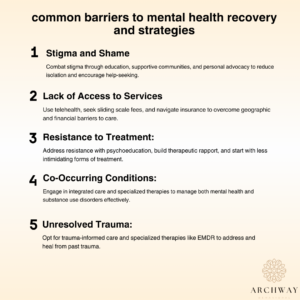Mental health recovery is a journey marked by progress and challenges. While the path to recovery can be deeply transformative, several barriers can hinder progress and make the process seem daunting. Identifying and addressing these barriers is crucial for achieving a successful and sustainable recovery. Here’s a look at common obstacles to mental health recovery and strategies to overcome them:
1. Stigma and Shame
Barrier: Stigma surrounding mental health issues can lead to feelings of shame and isolation, making it difficult for individuals to seek help.
Strategies to Overcome:
- Education and Awareness: Increase awareness about mental health conditions and their treatment to combat stigma and promote understanding.
- Supportive Communities: Engage with support groups and communities where open conversations about mental health are encouraged.
- Personal Advocacy: Encourage self-advocacy and open discussions with friends, family, and employers about mental health needs.
2. Lack of Access to Services
Barrier: Limited access to mental health services, whether due to geographical location, financial constraints, or insurance issues, can impede recovery.
Strategies to Overcome:
- Telehealth Services: Utilize telehealth options to access therapy and counseling remotely, especially if local services are scarce.
- Sliding Scale Fees: Seek providers that offer sliding scale fees based on income or explore community mental health centers that offer low-cost services.
- Insurance Navigation: Work with insurance representatives to understand and maximize your mental health coverage.
3. Resistance to Treatment
Barrier: Some individuals may resist treatment due to fear, skepticism, or a lack of motivation.
Strategies to Overcome:
- Psychoeducation: Provide education about the benefits of treatment and how it can improve quality of life.
- Therapeutic Rapport: Build a strong therapeutic alliance with a mental health professional to foster trust and openness.
- Gradual Engagement: Start with less intimidating forms of treatment or support, such as self-help resources or peer support, to ease into professional care.
4. Co-Occurring Conditions
Barrier: Co-occurring mental health and substance use disorders can complicate recovery efforts and require integrated treatment approaches.
Strategies to Overcome:
- Integrated Care: Seek treatment programs that address both mental health and substance use disorders simultaneously for comprehensive care.
- Specialized Therapies: Engage in therapies like Cognitive Behavioral Therapy (CBT) and Dialectical Behavior Therapy (DBT), which are effective for managing co-occurring conditions.
- Holistic Approaches: Incorporate holistic practices such as mindfulness, nutrition, and physical exercise to support overall well-being.
5. Unresolved Trauma
Barrier: Past trauma can hinder recovery by causing persistent emotional and psychological issues.
Strategies to Overcome:
- Trauma-Informed Care: Choose providers who use trauma-informed approaches to ensure that treatment is sensitive to the impacts of trauma.
- Trauma Therapy: Engage in specialized trauma therapies such as Eye Movement Desensitization and Reprocessing (EMDR) or Trauma-Focused CBT to process and heal from traumatic experiences.
- Safe Environment: Create a supportive and safe environment where individuals feel secure in addressing and working through trauma.
6. Financial Constraints
Barrier: Financial difficulties can limit access to quality mental health care and resources.
Strategies to Overcome:
- Financial Assistance: Explore financial assistance programs, grants, and charitable organizations that offer support for mental health services.
- Community Resources: Utilize community resources and non-profit organizations that provide free or low-cost mental health services.
- Budgeting for Care: Prioritize mental health care in budgeting and seek out cost-effective treatment options.
7. Poor Self-Care and Lifestyle Factors
Barrier: Inadequate self-care, poor diet, lack of exercise, and insufficient sleep can negatively impact mental health recovery.
Strategies to Overcome:
- Routine Development: Establish a daily routine that includes self-care practices such as regular sleep, balanced nutrition, and physical activity.
- Mindfulness Practices: Incorporate mindfulness and relaxation techniques to manage stress and promote emotional well-being.
- Healthy Habits: Set achievable goals for lifestyle changes and gradually incorporate them into your daily life.
8. Social Isolation
Barrier: Lack of social support or isolation can exacerbate mental health challenges and impede recovery.
Strategies to Overcome:
- Social Engagement: Build and maintain supportive relationships with friends, family, and peers.
- Support Groups: Join support groups or online communities where individuals share similar experiences and offer mutual support.
- Volunteering: Engage in volunteer work or community activities to foster connections and enhance feelings of purpose.
9. Inconsistent Treatment Adherence
Barrier: Inconsistent adherence to treatment plans and medications can undermine progress and recovery.
Strategies to Overcome:
- Treatment Planning: Work with a mental health professional to develop a clear and manageable treatment plan.
- Medication Management: Set up reminders and utilize support systems to help adhere to medication regimens.
- Regular Follow-Ups: Schedule regular follow-up appointments to monitor progress and make adjustments as needed.
Conclusion
Overcoming barriers to mental health recovery requires perseverance, determination, and a willingness to seek help. By addressing both internal and external challenges, you can take significant steps towards healing and building a fulfilling life.
Remember, you are not alone. There are many resources available to support you on your journey to mental health recovery. By seeking professional help, building a support network, and practicing self-care, you can break free from barriers and achieve lasting well-being.
Archway Behavioral Health is dedicated to providing comprehensive mental health services to individuals facing challenges to recovery. Our team of experienced professionals offers compassionate support, personalized treatment plans, and a safe and welcoming environment. Contact us today to learn more or to schedule an appointment.
If you or someone you love is struggling with mental health, don’t wait. Comprehensive treatment is available, and recovery is possible. Contact us at (888) 488-4103 to learn more about our specialized programs for trauma, depression, OCD, and more, and take the first step toward a healthier, more balanced future.
FAQs: Barriers to Mental Health Recovery
What are some common barriers to mental health recovery?
Common barriers to mental health recovery include internal factors like fear, stigma, negative self-talk, and perfectionism, as well as external factors like limited access to resources, social isolation, and lack of support systems.
Why is it important to overcome these barriers?
Overcoming barriers to mental health recovery is crucial for achieving lasting well-being. These barriers can prevent individuals from seeking help, accessing necessary resources, and making progress on their healing journey.
How can I overcome fear and stigma associated with mental health?
Challenging negative beliefs, educating yourself about mental health, and seeking support from others can help you overcome fear and stigma.
What can I do to address negative self-talk?
Identify self-critical thoughts and replace them with positive affirmations. Practice self-compassion and treat yourself with kindness and understanding.
How can I break free from denial and avoidance?
Acknowledge the existence of mental health issues and confront challenges head-on. Seek professional help and build a support network to address underlying problems.
How can I build a stronger support network?
Connect with friends, family, or loved ones, join support groups, or volunteer in your community.
How can I overcome cultural or societal factors that hinder mental health recovery?
Educate yourself about cultural beliefs and attitudes towards mental health, and advocate for change within your community.



